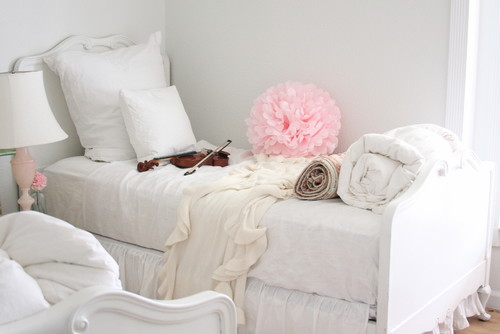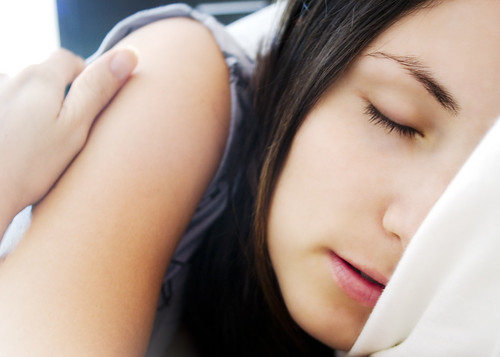Tag Archives: Tips for better sleep
Tips & Tricks: 6 Suggestions to Stay Cool When You Sleep
Post by Tracy Kaler.
When it comes to sleeping, a comfortable temperature in the bedroom is almost as important as a comfortable mattress on the bed. If you find that you’re often waking during the night, you could be too warm.
Body temperature shouldn’t rise when you get in the sack. In fact, to fall asleep and stay asleep, your overall temperature should remain cool. So if you feel warm in bed, heed these six suggestions so you can chill out when it’s time to snooze.
1. Stick your sheets and pillowcases into a plastic bag and place in the freezer for a few minutes just before you hit the hay.
2. Wear cotton or silk bedclothes. Both fibers are breathable and more likely to keep you cooler than polyester.
3. Take a cool shower before you crawl in bed. Even a quick rinse might be enough to lower your body temperature.
4. Avoid spicy food too close to bedtime. For medical reasons, it’s also not a good idea to eat too late in the evening, but hot and spicy dishes could leave you feeling a tad warmer than you should.
5. Try a cooling pillow, which can help regulate your head and face temperature so you don’t get overheated and wake up before the alarm sounds.
6. Purchase a tabletop fan. Although many bedrooms come with ceiling fans, an additional fan on a nightstand or table can circulate enough air to keep you cool as a cucumber until morning.
Things We Like: Placebo Sleep
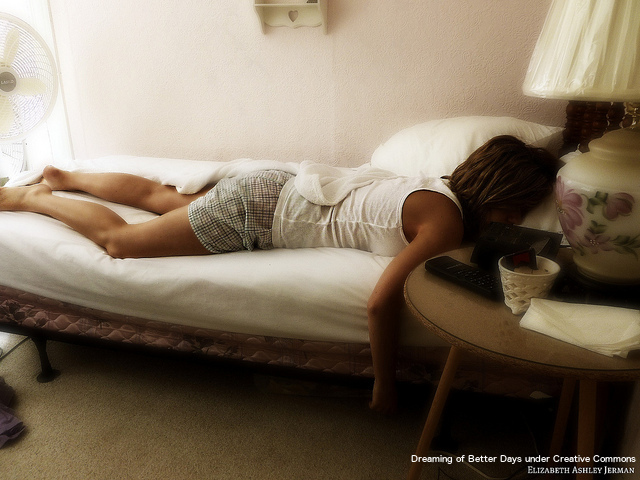
Post by Kyle St. Romain.
A lot of the articles I’ve posted here on the Charles P Rogers blog deal with ways to help you sleep better. A comfortable bed, proper diet, enough exercise, and a solid routine are all cornerstones to a good night’s sleep. However, I recently came across a study that found simply believing you’ve slept well improves cognitive performance, even if you actually didn’t sleep well at all — a classic example of mind over matter.
The study, “Placebo Sleep Affects Cognitive Functioning,” was conducted by researchers from Colorado College, and is published in the Journal of Experimental Psychology. In a nutshell, the researchers hooked up their participants to a bunch of fancy equipment and told them that it would measure the amount of REM sleep they got. Note: The equipment did not actually measure anything. The researchers then reported back to the participants with made up numbers about how much REM sleep they got the evening before. Participants were randomly told they got 16.2 percent or 28.7 percent REM sleep, regardless of what may have actually been recorded.
After being told their results, the participants were asked to take a series of tests to measure their cognitive performance. As the title of this post suggests, the participants who were told they had a higher level of REM sleep the night before performed better on the tests than their peers. Some other controls were put in place to help get rid of bias and the subjects’ self-reported sleep quality, and the results held.
So what does this mean for the rest of us? Basically, it confirms the adage that if you change your mind, your body will follow. If you’re in the mindset that you’re getting good sleep, then your brain will perform like you actually got good sleep irrespective of your actual sleep quality. The opposite also holds true: if you’re always thinking about what a bad night’s sleep you got, then your mind will perform like you did, even if you slept wonderfully the night before.
So while a comfortable bed, in an ideal sleeping environment may help you actually sleep better, you need to believe that you are sleeping better too. For me, I’m going to make a conscious effort to tell myself what a good night’s sleep I got and hope that my mind adjusts accordingly. This may be especially important with a lengthy test coming up next week, one where I’ll need every cognitive advantage I can find.
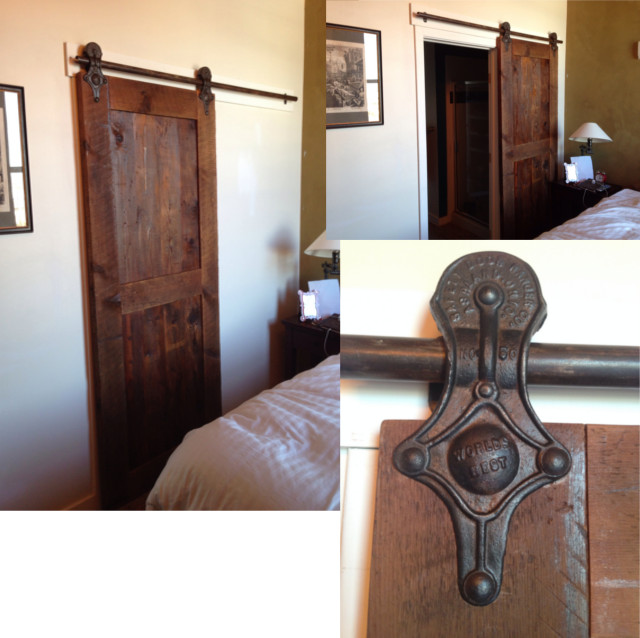
As an update to last week’s article on barn doors in the bedroom, I’ve included some pictures of what my barn door looks like. There is still a lot of work to be done with the bathroom remodel, but it’s good to see some progress! While I was a little skeptical about how would look in my room, and how functional it would be, I honestly couldn’t be happier with the way it turned out. It fits over my existing doorframe like a glove, and the substantial heft of the reclaimed barn wood blocks affords a lot more privacy than I had expected. An unexpected bonus is that I was able to use old hardware that was reclaimed from an old barn nearby. The door has a lot of character and, in my mind, is truly irreplaceable. It is definitely something I plan to keep and use wherever I live.
Things We Like: Eliminating Electronics For Better Sleep
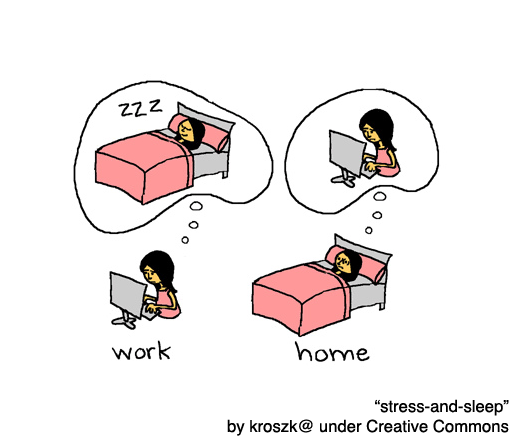
Post by Kyle St. Romain.
This week I’ll introduce you to a sleep tip that many of you are probably aware of, but do not practice: keeping the phone (and other electronics) away from the bed.
I often think, as do a lot of people I meet, that sleeping with the cell phone, tablet, or other electronic device by the bed is bad for sleep. Why? Because, with your phone at an arm’s length away, we are constantly tempted to check our email or read an excessive amount of news before bed—electronics enable the insomniac in all of us. To help reduce the negative consequences of sleeping in an ever-connected, 24/7 world, I’ve put together three steps to help you get the good night’s sleep you’ve been craving.
Step One: Turn The Screen Off
The first way that electronics affect sleep is by exposing us to unnaturally bright light after. Light inhibits the body’s release of melatonin, a hormone that promotes sleep. This is a natural reaction, and is what helps our bodies stay awake during the daytime; however, when you introduce artificial light after the sun has gone down, your body is tricked into thinking it should still be awake. We all have different light sensitivities, and I didn’t notice the effect until I started reading under a full-spectrum light. While it helped with Seasonal Affective Disorder (the winter blues), it kept me wide-awake and alert far past my bedtime—more than any amount of coffee ever could.
I touched on this idea a while back in an article about color shifting your computer screen for better sleep. This little trick not only helps alleviate eyestrain, but it also helps your body prepare for sleep.
To further resolve this problem, try setting an electronics curfew for yourself. All you need to do is have the discipline to cut out your use of electronics 60 to 90 minutes before you go to sleep. Easier said than done, I know.
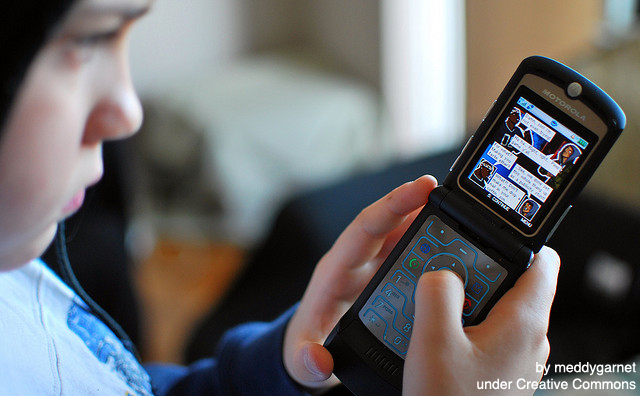
Step Two: Eliminate Distractions
Even if our bodies didn’t respond to bright lights, electronics affect us psychologically with the media they display. Have you ever found yourself unable to sleep after a scary movie? It’s likely due to the adrenaline your body produces in its natural fight-or-flight reaction.
Eliminating stress and anxiety triggers before sleep should help your mind stay calm and collected—an essential ingredient for a good night’s rest. So even if you can’t pry yourself away from watching another episode of your favorite show or reading that last-minute email, save the stressful stuff for the morning.
Step Three: Move Your Electronics Away From The Bed
If you’ve been unable to get that restorative sleep you’ve been aiming for, the problem might be sitting right next to you. And even if you aren’t actively using electronics before bed, they can still disrupt your sleep. Anything electronic produces electromagnetic radiation (EMR), which affects your body’s production of melatonin and serotonin. EMR is also thought to make us more sensitive to the fight-or-flight state, which is otherwise caused by psychological triggers like a scary movie or an upsetting email. This is known as the “wired-and-tired” effect, and is one of the reasons we find ourselves awakening from a long sleep, but still feeling exhausted.
To reduce your exposure to EMR, try moving your electronics as far away from the bed as possible. While it may take a few weeks, or even months to see results, the long-term benefits will be well worth it. After all, there is nothing natural about sleeping next to a cell phone.
Things We Like: Warm Feet For Better Sleep

Post by Kyle St. Romain.
Do you ever get cold feet when falling asleep? Apparently, cold feet may actually inhibit your ability to fall asleep quickly. A group of Swiss researches conducted a study a while back that found a correlation between the distal-proximal temperature gradient — a fancy term used to measure the blood flow in your hands and feed — and your body’s ability to fall asleep quickly. In other words, the warmer your hands and feet are in the late evening, the faster you’re able to fall asleep.
The researchers learned some other interesting connections between body temperature and sleep: your body temperature predictably increases on its own as it readies for sleep. This change in temperature can be triggered by a number of factors such as whether you’re lying down (which pushes blood and heat out to your fingers and toes), where your body is along its circadian clock (your natural clock starts warming you up for bedtime on its own), and whether it’s dark outside (darkness is a long-time trigger for sleep). And for those of you who like to sleep with the air conditioning on cold, it may actually be due to the fact that a cooler ambient temperature increases the transfer of heat at your extremities.
Some people have suggested that wearing socks can help you fall asleep faster, but many have expressed a general discomfort for wearing extra clothing to bed. Fortunately, if you’re one of those people who doesn’t like wearing socks to bed, you can stimulate a similar effect by placing a warm bottle of water at the foot of the bed. In earlier times, many households used metal pans filled with hot coals to warm the bed. Today, plastic has made it much easier (and safer) to achieve the same effect.
If you’d like to read more about the study’s findings, you can find a nice summary of the research here (and it’s free). The text begins at the top right column, and continues down to the second page.
Do you find that you sleep better with warm feet (or socks on)? Do you have any other tips and tricks that help you doze off quicker? Share your thoughts with us in the comments below.

